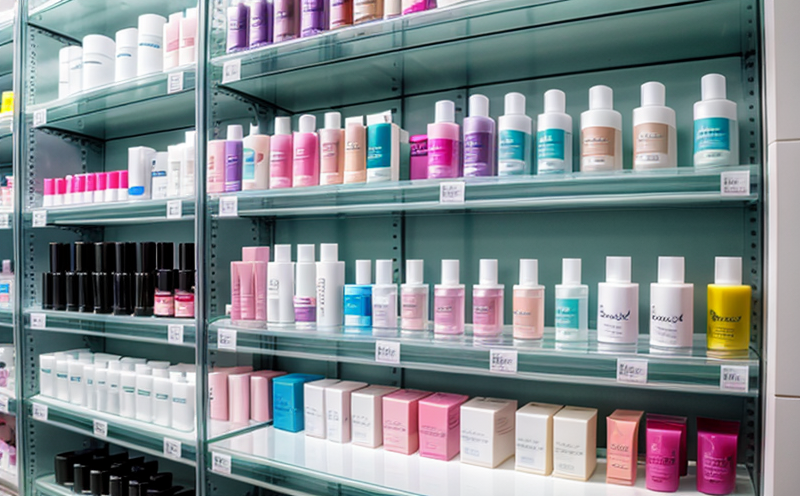Shelf Life of Cosmetic Powders under Humidity Stress
The shelf life of cosmetic powders is a critical aspect in the development and quality assurance of cosmetics. Environmental factors such as humidity can significantly impact the stability, texture, and efficacy of these products over time. Understanding how these conditions affect powder formulations allows manufacturers to ensure product integrity and meet regulatory standards.
Humidity stress testing is crucial for ensuring that cosmetic powders maintain their physical and chemical properties over extended periods. This test evaluates the ability of a powder formulation to withstand moisture exposure without degrading in terms of texture, color, or functionality. The outcome of such tests influences product safety, effectiveness, and consumer satisfaction.
During this testing process, cosmetic powders are subjected to controlled humidity levels that simulate real-world conditions encountered during storage and use. The results help determine the optimal packaging materials and storage environments necessary for preserving the quality of the product. Properly conducted shelf life studies under humidity stress can reduce waste, enhance consumer trust, and ensure compliance with international standards.
The importance of this service extends beyond just cosmetic powders; it applies to a broader range of powder-based formulations within the cosmetics industry. By understanding how different environmental factors affect these products, manufacturers can improve product formulation, packaging design, and overall quality control processes. This knowledge is essential for maintaining high standards in the competitive global market.
International standards such as ISO 7825-1:2019 provide guidelines on determining the shelf life of cosmetic products under various conditions including humidity stress. Compliance with these standards not only ensures product quality but also facilitates smoother regulatory compliance and broader market access.
In summary, testing the shelf life of cosmetic powders under humidity stress is vital for ensuring consistent quality throughout the product lifecycle. This service helps manufacturers make informed decisions regarding formulation adjustments, packaging solutions, and storage protocols, ultimately leading to better customer satisfaction and trust in the brand.
Scope and Methodology
| Parameter | Description |
|---|---|
| Test Specimens | Powder formulations of cosmetic products, including but not limited to face powders, body powders, and eye shadows. |
| Environmental Conditions | Controlled humidity levels ranging from 40% RH to 95% RH for specified durations. |
| Sampling Frequency | Samples collected at regular intervals during the test period, typically every 6 months or as per client specifications. |
| Instrumentation | Humidity control chambers and analytical equipment for measuring physical and chemical properties of powders. |
| Data Analysis | Analyzing changes in texture, color, particle size distribution, and stability over time to assess shelf life. |
International Acceptance and Recognition
The importance of testing cosmetic powders under humidity stress is widely recognized by international standards bodies. Compliance with these standards ensures that the products meet global quality benchmarks, enhancing consumer confidence.
ISO 7825-1:2019 provides a framework for determining the shelf life of cosmetic products in various environmental conditions, including humidity stress. This standard is internationally accepted and widely used by manufacturers to ensure product consistency and safety.
The European Union's Cosmetics Regulation (EC) No 1223/2009 also emphasizes the need for robust testing procedures that include exposure to different environmental factors like humidity. By adhering to these regulations, cosmetic companies can demonstrate their commitment to maintaining high standards of quality and safety.
Other countries have similar regulatory frameworks in place, further emphasizing the importance of this service. For instance, the U.S. Food and Drug Administration (FDA) requires manufacturers to conduct shelf life studies that account for environmental stress factors such as humidity. This ensures products are safe and effective throughout their lifecycle.
By aligning with these international standards and regulations, cosmetic companies can ensure their products meet rigorous quality controls, thereby gaining a competitive edge in the global market. Consumers also benefit from more reliable and consistent product performance over time.
Environmental and Sustainability Contributions
Testing the shelf life of cosmetic powders under humidity stress contributes positively to environmental sustainability by promoting responsible manufacturing practices. Understanding how products behave in real-world conditions helps reduce waste, optimize packaging materials, and improve overall efficiency.
By accurately predicting the shelf life of cosmetic powders, manufacturers can design more effective storage solutions that minimize waste due to expiration. This not only reduces the environmental impact of discarded products but also lowers production costs associated with frequent formulation adjustments and retesting.
The use of controlled humidity chambers for testing aligns with broader sustainability goals by focusing on energy-efficient practices. These chambers operate at optimal temperatures and humidity levels, ensuring precise and repeatable results while minimizing resource consumption. Additionally, the data collected from these tests can inform decisions about sustainable packaging materials that protect products during transport and storage.
Moreover, adherence to international standards like ISO 7825-1:2019 ensures compliance with global regulations designed to promote responsible environmental stewardship within the cosmetics industry. By participating in this standard-setting process, cosmetic companies contribute to a more sustainable future while maintaining high product quality.
In conclusion, testing the shelf life of cosmetic powders under humidity stress is not only crucial for ensuring product quality and safety but also plays a significant role in promoting environmental sustainability through responsible manufacturing practices. This service helps manufacturers make informed decisions that benefit both their business operations and the environment.





